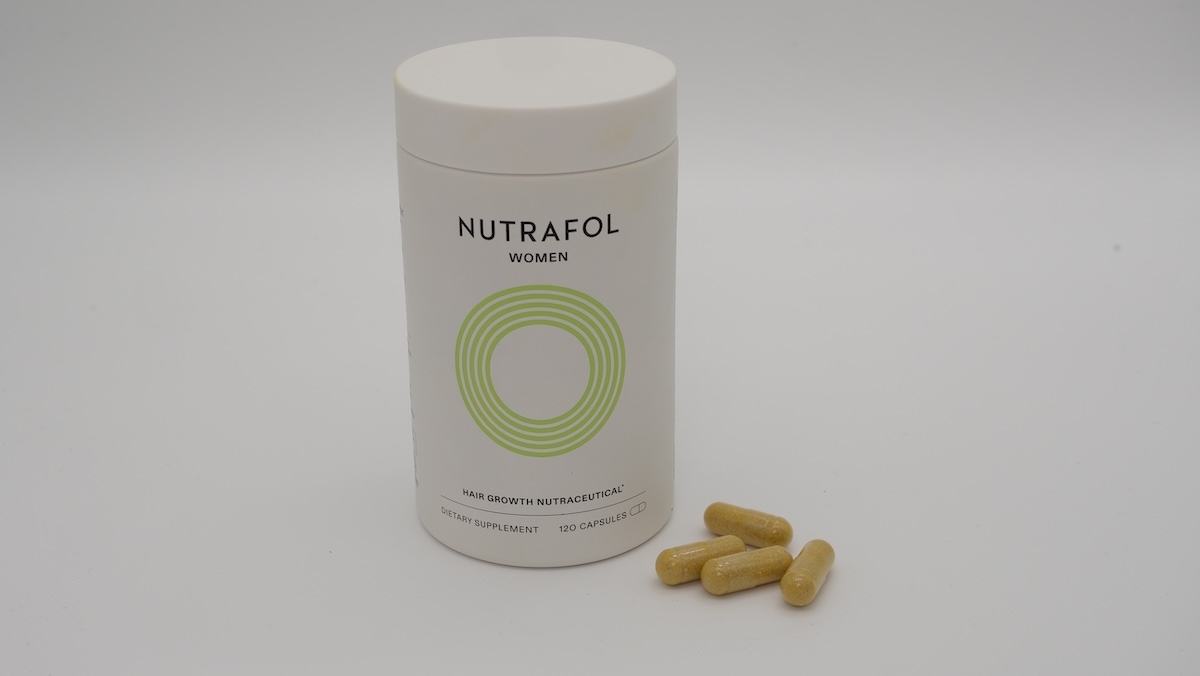Nov 11, 2024
Fact Checked
What’s the best vitamin for hair loss? We researched and tested the top supplements, highlighting the best options based on ingredients, affordability, and expert advice.
Key Takeaways
- Our picks for the best vitamins for hair loss are Nutrafol, Ro, and Divi.
- Nutrafol supplements were our best overall pick because its products are clinically tested.
- The products in this article cost between $29 and $88 per month, and monthly subscriptions often include free delivery.
- Common causes of hair loss include stress, underlying health conditions, and genetics.
- Vitamins may not be for everyone because they can interact with medications and other health conditions, or cause an allergic reaction.
When choosing the best hair loss treatment, you have a lot of options to consider, including prescription medications and nonprescription treatments like vitamins. In this article, we review some of the best vitamins for hair loss based on our research and testing.
Vitamin supplements may help with hair loss caused by vitamin or nutrient deficiencies. Certain vitamins may also help with other types of hair loss, like androgenetic alopecia (AGA), telogen effluvium, and alopecia areata. You should consult with your doctor to determine the cause of your hair loss before starting any vitamin supplements.
We researched a wide range of supplements to highlight those with promising research-backed ingredients and good customer reviews. If you’re considering a nonprescription approach, we break down the benefits, safety callouts, and important details to help you choose the best option for your hair health. You can also read our reviews of the best hair loss treatments for women and the best hair loss treatments for men.
Best hair loss vitamins in 2024
What we look for in hair loss vitamins
We considered a few factors when comparing hair loss vitamins:


Full ingredient lists
The Food and Drug Administration (FDA) requires manufacturers of dietary supplements to list their ingredients, including vitamin and mineral amounts, on a supplement facts label. We looked for supplements that displayed a full list of ingredients so buyers (and their doctors) can compare and decide whether they’re safe to take.


Third-party certifications
Dietary supplements aren’t regulated like medications. To verify quality, some companies voluntarily undergo third-party testing. This extra step helps confirm the product meets certain standards for quality and safety. During our research, we found that many hair supplements lacked third-party certifications, so we prioritized the ones that did.


Research-backed ingredients
Many vitamins, minerals, and herbs have not been well-studied for their effects on hair growth. Still, we looked for formulas that contain ingredients that have been verified as safe for most users and supportive of hair health, like saw palmetto, biotin, folate, niacin, iron, and vitamin D.


Simple subscriptions
Some brands that offer subscriptions for their hair vitamins provide discounts for recurring deliveries. We chose brands that allow buyers to cancel their subscription anytime in case they want to stop or pause their treatment.

Supplementation for hair health
According to the AAD, nutrient deficiencies can contribute to hair loss, and your doctor may recommend vitamins if they find a nutrient deficiency from testing. Research doesn’t support supplementation for people who are otherwise healthy. This is because taking extra vitamins, especially at high doses, can increase the risk of side effects. For example, taking too much zinc can result in stomach pain or nausea.
Nutrafol: Best Overall
Our expert take on Nutrafol
Nutrafol is a company with supplements designed to support hair health in specific groups of people:
- Nutrafol Women, for people 18–44
- Nutrafol Women’s Vegan, for people 18–44 who follow a vegan diet
- Nutrafol Men, for people 18 and older
- Nutrafol Women’s Balance, for people who are 45 and older
- Nutrafol Postpartum, for people who are in their first year after childbirth
Our Reviews Team chose Nutrafol as the “Best Overall” option for hair loss vitamins because it’s one of the few companies that clinically tests its supplements in healthy men, women, and people going through menopause who have hair thinning. In one of these tests, which was funded by Nutrafol, men and women of diverse ethnicities taking Nutrafol for six months reported better hair quality and more hair covering their scalp. In another clinical trial, women who were going through menopause and taking Nutrafol Balance reported more hair growth and less shedding after six months, and better hair growth and healthier-looking hair after nine months.
The results of these Nutrafol-funded studies are published in peer-reviewed journals. Because of its published research and low side effect profile, some dermatologists we interviewed recommend it as a nonprescription option for people who are otherwise healthy and willing to invest in the treatment.


Although some research has been done on Nutrafol to back up its positive effects on thinning hair, it may not be for everyone. Its mix of vitamins, minerals, and herbs may interact with other medications or health conditions you’re managing. Always talk to your primary care doctor before taking this or any other type of supplement. For people who have trouble swallowing, such as those recovering from bariatric surgery, it may help to know that a Nutrafol daily dose is four capsules a day. One tester also noted that they did not like the smell of the capsules, which made it hard for them to take so many per day.
If you’re looking for a vegan supplement or are sensitive to biotin, a common ingredient in many hair loss vitamins, consider Nutrafol Women’s Vegan. It doesn’t contain biotin or the fish-derived collagen used in the other Nutrafol vitamins. You can view all of the ingredients in each Nutrafol supplement on the website.
For the budget-conscious, the cost of a Nutrafol subscription is something to consider since new hair growth typically takes months to start seeing results—at least four to six months, according to experts. Subscriptions start at $70 per month for a six-month subscription ($422 total). But there are extra benefits that may make it worth the higher cost. Each Nutrafol subscription also includes free shipping, wellness coaching with a naturopathic doctor, hair mineral analysis testing (if needed), and a
Headspaceⓘ
A mental health platform that helps users practice mindfulness and meditation
subscription.
The FDA doesn’t regulate dietary supplements the way it does medications and drugs. For this reason, we like that Nutrafol products are third-party laboratory tested, which can give buyers confidence in what their vitamins contain. All Nutrafol products are manufactured in the United States with domestic and imported ingredients.
Who may benefit
- People who want to try a vitamin option for three or more months
- People looking for holistic support for hair health
- Those who want a hair supplement without biotin (Nutrafol Women’s Vegan)
Who may consider other options
- Budget-conscious buyers
- People managing multiple medications or health conditions
- Those who might have trouble swallowing four capsules a day
Customer reviews
Nutrafol shares customer success stories on its website, showing before-and-after pictures of people taking a Nutrafol product for six months or more. Nutrafol is also offered through online retailers such as Amazon, where we read mixed customer reviews. Some reviewers shared that they noticed decreased hair loss or increased hair growth, but others were disappointed in the lack of results after taking Nutrafol for a few months. Once you stop taking Nutrafol, you could see a gradual decrease in the growth or thickness of your hair. Some customers said they saw their previous hair growth patterns return when they stopped taking it.
“You just have to give it a good shot of at least a few months. I have been on other products, like shampoos, prescription pills and hair creams for over 10 years, and I would just see it slow my hair thinning, not grow it back. … It is even making my hairline better with new hairs growing past my existing hairline. I have been using this for 5 months now and I HIGHLY recommend it. Maybe the negative reviews are people who didn’t give it a few months to work, or their hair was too far gone, but this product for me is a game changer. It is expensive, but you get what you pay for sometimes.”
— Amazon Customer, verified purchaser, reviewed Nutrafol Men on July 23, 2024
Some reviewers also mentioned they had trouble taking the four pills daily, and opted for topical solutions instead:
“I dislike that you have to take 4 pills. I am already on medication that’s too many pills. … Do not put order on auto.”
— Sylvia F., reviewed Nutrafol Women’s Balance on Sept. 27, 2024
Ro Roman Hair Support: Best Affordable Option
Our expert take on Ro Roman Hair Support
Ro Roman Hair Support vitamins balance affordability with key ingredients often related to hair health. Its formula includes the daily recommended amounts of common vitamins and minerals like biotin, zinc, and vitamin D, which all play a role in supporting hair health.
Roman Hair Support contains saw palmetto and reishi mushroom, herbs that some research has suggested may have benefits for hair health. It’s important to note that since this formula isn’t clinically studied for its effects on hair loss, it’s not clear whether the combination of ingredients in the Roman Hair Support supplement will be effective.
Ro is an online men’s health platform, but Roman Hair Support can be taken by anyone. A health care professional, such as your primary care doctor or dermatologist, can tell you whether a hair loss vitamin is safe and appropriate for you to take. Ro Hair Support supplements are manufactured in the United States.
Though Ro only offers one- or three-month subscriptions for its hair vitamins, buyers can also find Roman Hair Support from online retailers such as Amazon and Walmart.
Who may benefit
- Budget-conscious buyers
Who may consider other options
- People who want vegan vitamins
Customer reviews
On Walmart and Amazon, Ro Roman Hair Support supplement has mixed reviews, similar to Nutrafol. We noticed that there weren’t many recent reviews of the product on both retailers. Some reviewers found the supplement easy to take, and some complained about online retailers shipping products without expiration dates.

Ordering supplements online
It’s important to check each box or bottle of supplements you purchase to make sure it’s not expired and the sealed packaging isn’t broken. Take care to inspect your supplements if you’re ordering from online retailers like Amazon or Walmart especially.
“Product is somewhat effective in preventing hair loss. The price is good compared to other hair loss products. There are no apparent side effects.”
— Hugo, verified buyer reviewed on June 29, 2024
Divi Hair Vitamins: Best to Support Hair and Skin Health
Our expert take on Divi Hair Vitamins
If you’re looking to support both skin and hair health, Divi Hair Vitamins may be worth considering because they contain Lustriva, a blend of ingredients with studies that support its benefits for hair and skin health. You can view the full ingredients list on the product page. In a small clinical study in healthy women, taking Lustriva for 12 weeks resulted in thicker hair and improvements in wrinkles.
Divi Hair Vitamins can be taken by men and women with thinning hair, but Lustriva has only been studied in women so far. There is currently an ongoing clinical study to see whether taking Lustriva for six months has an effect on hair and skin in healthy men and women.
Divi Hair Vitamins is also vegan, which makes it an option for people with plant-based lifestyles.
The amount of biotin in Divi Hair Vitamins is high: 10,000 micrograms, which is higher than what dermatologists we interviewed are comfortable recommending. High doses of biotin may not be necessary for everyone, and it may interfere with your blood test results, including for thyroid hormone, hepatitis B and C virus antibodies, and human immunodeficiency virus (HIV) antibodies. Discuss this product with your doctor before starting it to make sure it is right for you.
Similar to Nutrafol, Divi Hair recommends taking four capsules a day, which is something to consider for those who have trouble swallowing.
The ingredients in Divi Hair Vitamins are researched or are currently being researched, but it hasn’t been clinically studied as a whole. Because of its high biotin content and herbal ingredients, it’s a good idea to talk to your doctor about whether Divi Hair Vitamins would be safe and appropriate for you. Divi Hair Vitamins are also made in the United States.
Who may benefit
- People who choose a plant-based lifestyle
- Those who want to support skin and hair health
Who may consider other options
- People who are taking multiple medications or managing multiple health conditions
- Those who have trouble swallowing four capsules a day
Customer reviews
Reviews of Divi Hair Vitamins appear on the Divi website and on the websites of online retailers Amazon and Ulta. Similar to other hair vitamins we researched, Divi Hair Vitamins received mixed reviews from its buyers. Some reviewers mentioned seeing results as soon as a month, while others took it for several months with no changes to their hair.
“Great, effective product. Started to notice a real difference in hair growth after about 3 months. Recommend taking with food.”
— Elizabeth L.J., verified buyer on Aug. 24, 2024
“I have been using these vitamins for over 9 months now and really like the results I’m seeing! Even my hairstylist noticed my hair is thicker and longer. Huge deal coming from someone who has had very thin, fine hair all their life.”
— Ellie M., verified buyer on Sept. 11, 2024
How we test vitamins for hair loss
Our Reviews Team bases our recommendations on the best clinical guidelines and research on hair loss treatments. We talked with dermatologists and trichologists to get their expert recommendations for both prescription and over-the-counter products, including vitamins. We also surveyed hair loss treatment users age 45 and older and interviewed focus groups of users to better understand the experience of hair loss and hair loss treatment.
For platforms that offered subscriptions to hair vitamins, our testers signed up and paid special attention to the following:
- Treatments available, including prescription and over-the-counter options
- Shipping times, costs, or minimums
- Costs of subscriptions and products
- Whether retailers of vitamin products share a complete list of ingredients online
- How easy it is to use the app or website
- Treatment experience
- Customer service, including return policies and satisfaction guarantees
All of our reviews are medically reviewed by a licensed and practicing medical expert to ensure the information is accurate and up to date. You can learn more by reading our hair loss review methodology.
Can vitamins really help with hair loss?
Vitamins may help with hair loss for some, but the research is limited. And it’s unclear who might benefit most. According to the AAD, people who have been diagnosed with a nutrient deficiency, such as low iron, might see improvements by taking supplements that restore normal levels. In people without a deficiency, strong and consistent studies showing the benefits of vitamins, minerals, or herbal supplements for hair loss are lacking. Many of the products we researched received mixed reviews online from verified buyers.
The experts we consulted also noted that the effects of hair supplements can be difficult to predict, which is why some dermatologists don’t typically recommend them as a first option. The first treatment options can include medications like minoxidil and spironolactone. Christopher Chu, MD, FAAD, a dermatologist at Pure Dermatology in Austin, Texas, explained that while many vitamins contain ingredients that could potentially help with hair loss, it’s hard to know if any of those ingredients can make a real difference for someone. “Whether or not any of those individual ingredients are enough for hair loss is really hard for me to say,” said Dr. Chu.
How long do hair loss vitamins take to work?
According to the brands of the products we researched and experts we interviewed, hair loss vitamins take about the same amount of time as prescription medications to work. Vitamin brands typically say people can expect to see results after three to four months of taking it.
Are there any side effects to taking vitamins for hair loss?
Side effects of taking vitamins for hair loss depend on the supplement formula itself. In general, vitamins and minerals can cause side effects if you take too high of a dose. Here are a few examples of the side effects of common ingredients in hair loss vitamins:
- A high dose of zinc can make some people nauseous.
- A high dose of certain forms of iron may worsen constipation.
- Biotin, a common vitamin in hair loss supplements, can interfere with the results of common blood tests.
- Herbs can have many effects on the body, and some people may have an allergic reaction to them.
- Some types of herbs can interact with other medications you may be taking or health conditions you may have.
Talk to your doctor to learn whether a supplement is safe and appropriate for you.
Common causes of hair loss
The most common cause of hair loss in men and women is hereditary hair loss, also known as androgenetic hair loss, male pattern hair loss, or female pattern hair loss. Hereditary hair loss is influenced by your family history and your response to circulating hormones in the body. This results in hair follicles becoming smaller (called miniaturization), hair becoming thinner, and hair eventually falling out.
Other common causes of hair loss include:
- Age
- Autoimmune disorders
- Cancer treatment
- Childbirth or breastfeeding
- Menopause
- Recovering from a disease
- Having an operation
- Stress
- Hair care products or hairstyles
- Health conditions or medications
- Scalp infections
- Nutrient deficiencies
Table 1, Compare the best vitamins for hair loss as of 2024
*Orders over $49 receive free shipping, which applies when purchasing Divi Hair Vitamins
Bottom line
Many vitamins are marketed for hair loss, but the results can be mixed. We wanted to highlight the best vitamin options that may support hair health. Nutrafol stood out for its clinical studies and third-party testing. Divi Hair Vitamins has patented ingredients that are being studied to support hair loss. Ro Roman Hair Support is a budget-friendly option.
While vitamins may seem safer than prescription medications, it’s important to talk with a doctor, as high doses or long-term use may have unknown effects.
Frequently asked questions
Not every vitamin will work for everyone. It’s best to check with your doctor to see whether a vitamin will be safe and appropriate for you. Among the vitamins we researched, we found Nutrafol, Ro, and Divi to be options worth considering.
Biotin is involved in normal, healthy hair growth, but biotin vitamins may not work for everyone.
According to the AAD, people with a biotin, iron, protein, or zinc deficiency may experience hair loss. Adding these nutrients back into your diet or taking a supplement with these nutrients may help your hair regrow.
Have questions about this review? Email us at reviewsteam@ncoa.org.
Sources
- American Academy of Dermatology Association. Hair Loss: Diagnosis and Treatment. Dec. 13, 2022. Found on the internet at
- National Institute of Diabetes and Digestive and Kidney Diseases. Weight-Loss (Metabolic & Bariatric) Surgery. July 2016. Found on the internet at
- American Association of Naturopathic Physicians. What Is a Naturopathic Doctor? Found on the internet at
- Food and Drug Administration. Facts About Dietary Supplements. May 16, 2023. Found on the internet at
- National Institutes of Health Office of Dietary Supplements. Biotin. Jan. 15, 2021. Found on the internet at
- National Institutes of Health Office of Dietary Supplements. Zinc. Oct. 4, 2022. Found on the internet at
- Saini K and Mysore V. Role of Vitamin D in Hair Loss: A Short Review. Journal of Cosmetic Dermatology. Sep. 22, 2021. Found on the internet at
- Evron E, et al. Natural Hair Supplement: Friend or Foe? Saw Palmetto, a Systematic Review in Alopecia. Skin Appendage Disorders. Aug. 23, 2020. Found on the internet at
- Lee S, et al. Ganoderma lucidum Extract Attenuates Corticotropin-Releasing Hormone-Induced Cellular Senescence in Human Hair Follicle Cells. iScience. May 17, 2024. Found on the internet at
- Patel DP, et al. A Review of the Use of Biotin for Hair Loss. Skin Appendage Disorders. April 27, 2017. Found on the internet at
- Falotico JM and Lipner SR. Biotin Beware: Perils of Biotin Supplementation: Response to: “The Epidemiology, Impact, and Diagnosis of Micronutrient Nutritional Dermatoses. Part 2: B-Complex Vitamins.” Journal of the American Academy of Dermatology. June 2022. Found on the internet at
- Kalman DS and Hewlings SJ. A Randomized Double-Blind Evaluation of a Novel Biotin and Silicon Ingredient Complex on the Hair and Skin of Healthy Women. Journal of Clinical & Experimental Dermatology Research. Jan. 21, 2021. Found on the internet at
- ClinicalTrials.gov. Effectiveness of a Novel Dietary Ingredient on Hair Growth and Skin’s Appearance. Aug. 25, 2023. Found on the internet at
- American Academy of Dermatology Association. Hair Loss: Who Gets and Causes. Found on the internet at
- Almohanna H., et al. The Role of Vitamins and Minerals in Hair Loss: A Review. Dermatology and Therapy. Dec. 13, 2019. Found on the internet at











